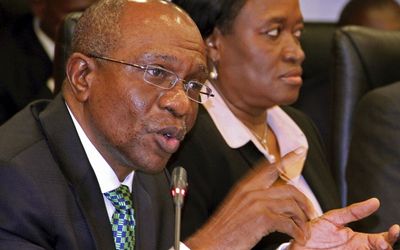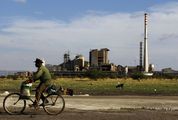Nigeria’s banks interrupt trade to mull control of naira
by Ed Cropley,
2015-01-27 18:10:27.0
WRAPPING up a monetary policy speech last week, Nigerian central bank governor Godwin Emefiele declared that the naira, which has crumbled to 190 to the dollar with the drop in oil prices, was "appropriately priced".
However, when currency dealers in Lagos and other financial centres in Africa and Europe got to work the next morning and turned on their computers, many were surprised to find the naira was not priced at all, let alone "appropriately".
Instead, as they stared at their screens, for three hours traders were presented with blank spaces where normally they see the "bids" and "offers" that determine the market price of the currency of Africa’s biggest oil producer and largest economy.
Rather than a computer glitch or power outage — common hiccups in any frontier market — the lack of prices was deliberate: all Nigeria’s banks were refusing to trade while their top dealers met behind closed doors to chew over Mr Emefiele’s pronouncements, according to those involved.
Among the decisions reached by the Financial Markets Dealers Association (FMDA), as the club of 40 banks, discount houses and brokerages is known, was an unofficial "circuit-break" agreement to halt trade if the naira fell more than 2% in a day.
The FMDA’s CEO, Wale Abe, insisted no central bank officials were present at last Wednesday’s meeting and said it was an entirely voluntary measure to curb volatility, in line with the body’s support for financial market stability and maturity.
However, the impromptu trading interruption runs counter to that objective, while the seemingly ad hoc decisions from a collective of rival banks raise questions about transparency, with some analysts suspecting hidden central bank regulation.
"This is extraordinary, especially when you’re trying to encourage an independent market where market forces determine the rate and you don’t have regulators casting a heavy hand," said one SA-based currency strategist, who asked not to be named.
"They’re basically setting limits on where the interbank market can trade," the strategist added. "It’s very informal and that’s the problem. You can’t begin to understand the market if you’re not sure what the underlying policy is."
The central bank declined to comment.
As the price of oil — the source of 95% of Nigeria’s foreign exchange — has collapsed in the last six months, the naira has tumbled more than 15% to a series of record lows, knee-capping the economy just weeks before nationwide elections on February 14.
Over the last year, the central bank has burnt through 20% of its reserves — $28m a day — in defence of a currency that has remained under unrelenting pressure because of a basic lack of petro-dollars.
In mid-January, reserves stood at $34.5bn.
Besides an official 8% devaluation in November accompanied by a 100 basis points interest-rate hike to a record 13%, the dwindling reserves have forced the central bank into less orthodox measures.
Prominent among these has been to declare war on currency "speculation" by making commercial banks close off their currency positions at the end of a trading day, rather than maintain an overnight stance on either the naira or dollar.
It relaxed that ban an inch last week but the market remains very illiquid, to the concern of outside investors such as JP Morgan, which threatened this month to eject Nigeria from its influential Emerging Markets Bond Index as a result.
The FMDA’s new-found clout is also unlikely to convince outsiders about the central bank’s control of the currency or the market, especially as last week was not the first time its members have brought trading to a halt for an hour or more.
"It sends a strong signal to the central bank," said Ecobank head of research Angus Downie.
"It’s quiet a drastic step to take and it raises the debate on the value of the naira, with dealers stepping out to say ‘We won’t trade’." However, the FMDA’s Mr Abe insisted there was no tension with the central bank, which enjoys "observer status" at his organisation.
"At the end of the day, what is important is the goals are the same: to have a market that is transparent, that is open and which can compare with developed or mature markets, or emerging markets," he said.
In a nod to investors, he also said the group had decided to make their collective decisions clear from now on, even if the deliberations of their meetings remained unreported.
"If you have a trade association, do you have every Tom, Dick or Harry getting into meetings? No," he said. "But any meeting we have from now, you will have one of us addressing the press. You will have the statement issued."
Reuters

Godwin Emefiele. Picture: REUTERS
WRAPPING up a monetary policy speech last week, Nigerian central bank governor Godwin Emefiele declared that the naira, which has crumbled to 190 to the dollar with the drop in oil prices, was "appropriately priced".
However, when currency dealers in Lagos and other financial centres in Africa and Europe got to work the next morning and turned on their computers, many were surprised to find the naira was not priced at all, let alone "appropriately".
Instead, as they stared at their screens, for three hours traders were presented with blank spaces where normally they see the "bids" and "offers" that determine the market price of the currency of Africa’s biggest oil producer and largest economy.
Rather than a computer glitch or power outage — common hiccups in any frontier market — the lack of prices was deliberate: all Nigeria’s banks were refusing to trade while their top dealers met behind closed doors to chew over Mr Emefiele’s pronouncements, according to those involved.
Among the decisions reached by the Financial Markets Dealers Association (FMDA), as the club of 40 banks, discount houses and brokerages is known, was an unofficial "circuit-break" agreement to halt trade if the naira fell more than 2% in a day.
The FMDA’s CEO, Wale Abe, insisted no central bank officials were present at last Wednesday’s meeting and said it was an entirely voluntary measure to curb volatility, in line with the body’s support for financial market stability and maturity.
However, the impromptu trading interruption runs counter to that objective, while the seemingly ad hoc decisions from a collective of rival banks raise questions about transparency, with some analysts suspecting hidden central bank regulation.
"This is extraordinary, especially when you’re trying to encourage an independent market where market forces determine the rate and you don’t have regulators casting a heavy hand," said one SA-based currency strategist, who asked not to be named.
"They’re basically setting limits on where the interbank market can trade," the strategist added. "It’s very informal and that’s the problem. You can’t begin to understand the market if you’re not sure what the underlying policy is."
The central bank declined to comment.
As the price of oil — the source of 95% of Nigeria’s foreign exchange — has collapsed in the last six months, the naira has tumbled more than 15% to a series of record lows, knee-capping the economy just weeks before nationwide elections on February 14.
Over the last year, the central bank has burnt through 20% of its reserves — $28m a day — in defence of a currency that has remained under unrelenting pressure because of a basic lack of petro-dollars.
In mid-January, reserves stood at $34.5bn.
Besides an official 8% devaluation in November accompanied by a 100 basis points interest-rate hike to a record 13%, the dwindling reserves have forced the central bank into less orthodox measures.
Prominent among these has been to declare war on currency "speculation" by making commercial banks close off their currency positions at the end of a trading day, rather than maintain an overnight stance on either the naira or dollar.
It relaxed that ban an inch last week but the market remains very illiquid, to the concern of outside investors such as JP Morgan, which threatened this month to eject Nigeria from its influential Emerging Markets Bond Index as a result.
The FMDA’s new-found clout is also unlikely to convince outsiders about the central bank’s control of the currency or the market, especially as last week was not the first time its members have brought trading to a halt for an hour or more.
"It sends a strong signal to the central bank," said Ecobank head of research Angus Downie.
"It’s quiet a drastic step to take and it raises the debate on the value of the naira, with dealers stepping out to say ‘We won’t trade’." However, the FMDA’s Mr Abe insisted there was no tension with the central bank, which enjoys "observer status" at his organisation.
"At the end of the day, what is important is the goals are the same: to have a market that is transparent, that is open and which can compare with developed or mature markets, or emerging markets," he said.
In a nod to investors, he also said the group had decided to make their collective decisions clear from now on, even if the deliberations of their meetings remained unreported.
"If you have a trade association, do you have every Tom, Dick or Harry getting into meetings? No," he said. "But any meeting we have from now, you will have one of us addressing the press. You will have the statement issued."
Reuters






















Post a comment